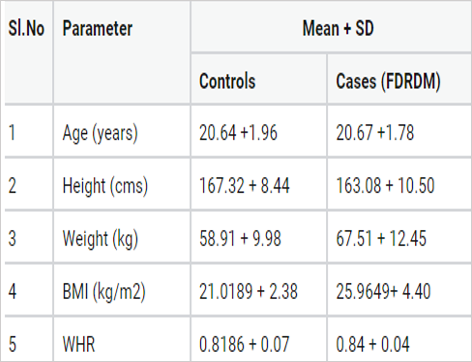Abstract
Indians are more susceptible to diabetes mellitus (DM) because of genetic reasons & improper life-style habits. Currently, the occurrence of DM has been prevalent in youngsters especially in India, in our present study, we attempted to explore the role of oxidative stress, inflammation in first degree relatives of type 2 diabetes mellitus (FDRDM). Inflammation was assessed by using high sensitive C reactive protein (hsCRP), Interleukin 6 (IL6), Tumor necrosis factor-alpha (TNF alpha), and oxidative stress by using malondialdehyde and total antioxidant status. FDRDM and control groups had similar for age, height, and waist-hip ratio (WHR). Weight and body mass index (BMI) was significantly high in FDRDM. Total antioxidant levels (TAOS) were less, and malondialdehyde (MDA) was significantly more in the FDRDM group. Inflammatory markers were significantly high in FDRDM. We conclude that increased oxidative stress and inflammation may lead to more derangements in glucose homeostasis in first degree relatives of type 2 diabetes (T2DM), it could increase the chances of development of cardiac events and necessitates early lifestyle modifications.
Full text article
Authors

This work is licensed under a Creative Commons Attribution-NonCommercial-NoDerivatives 4.0 International License.

